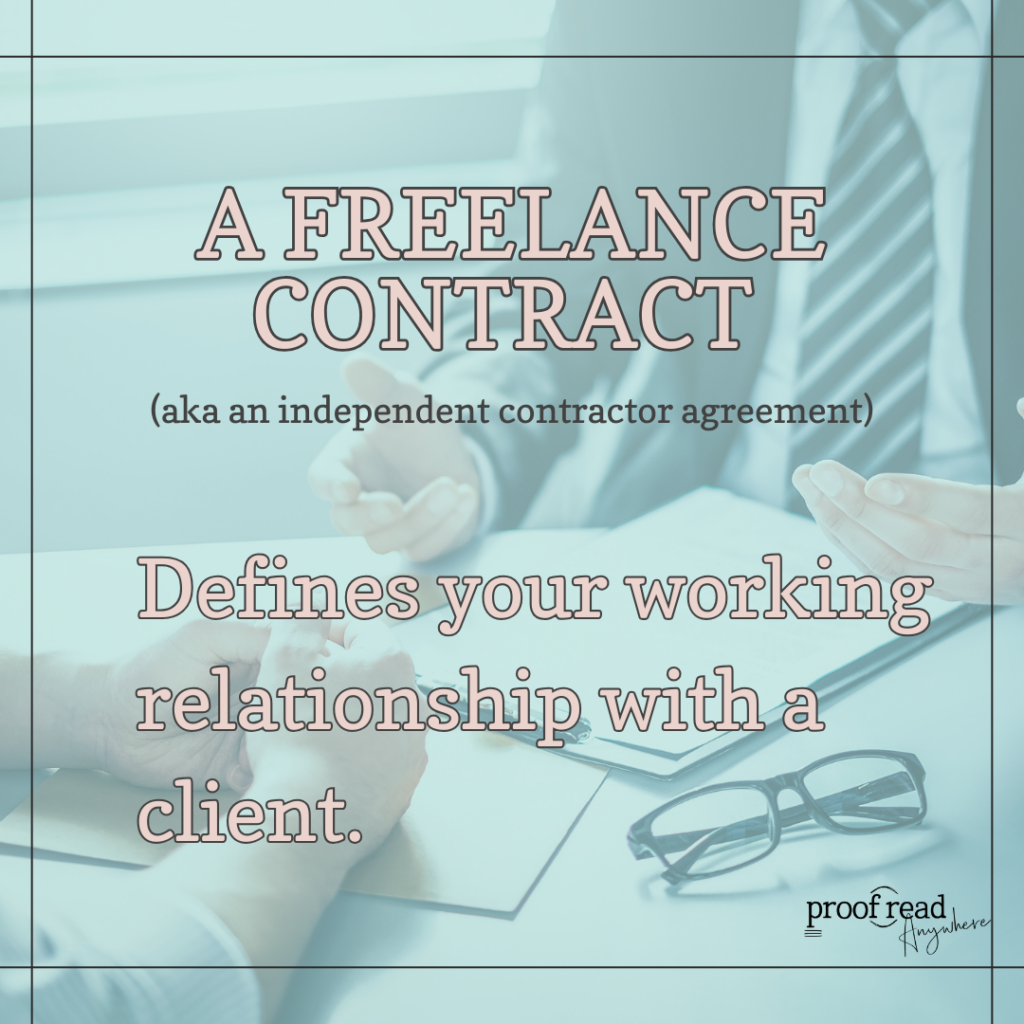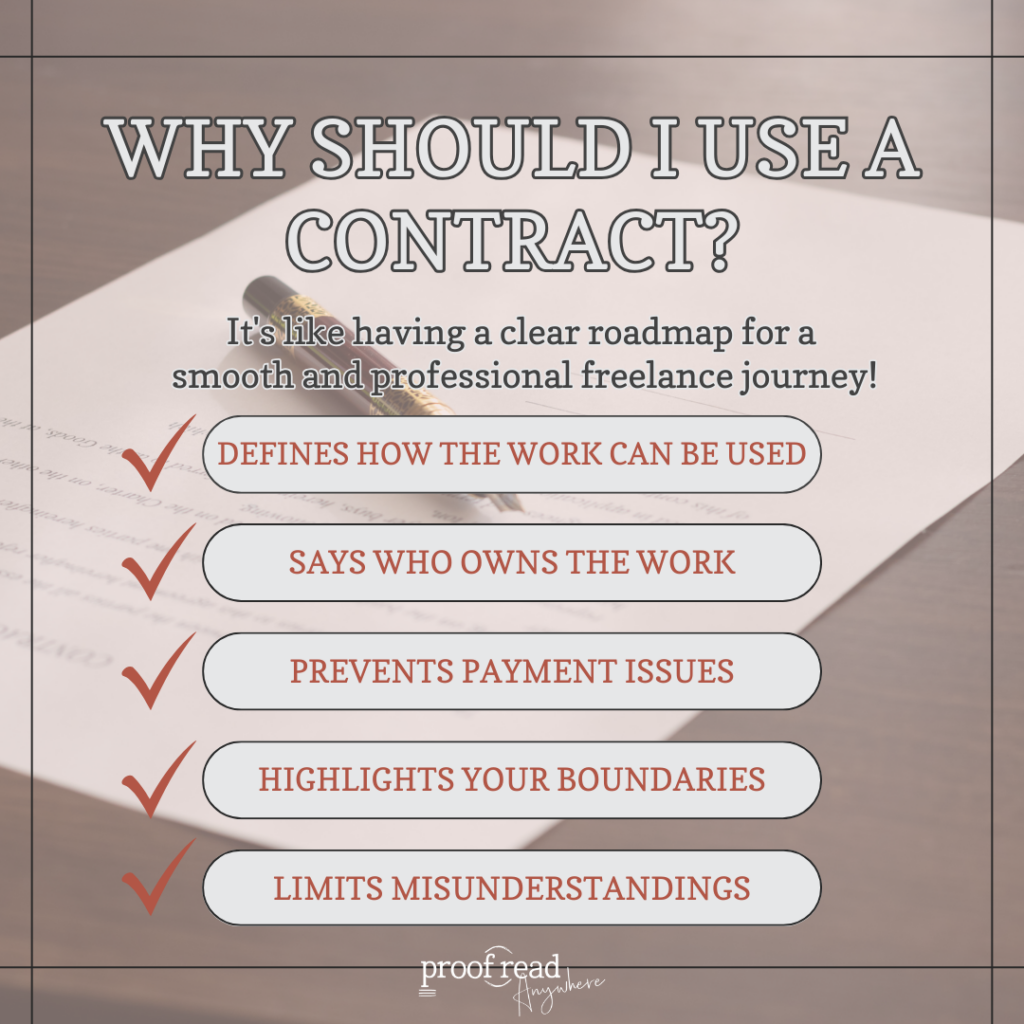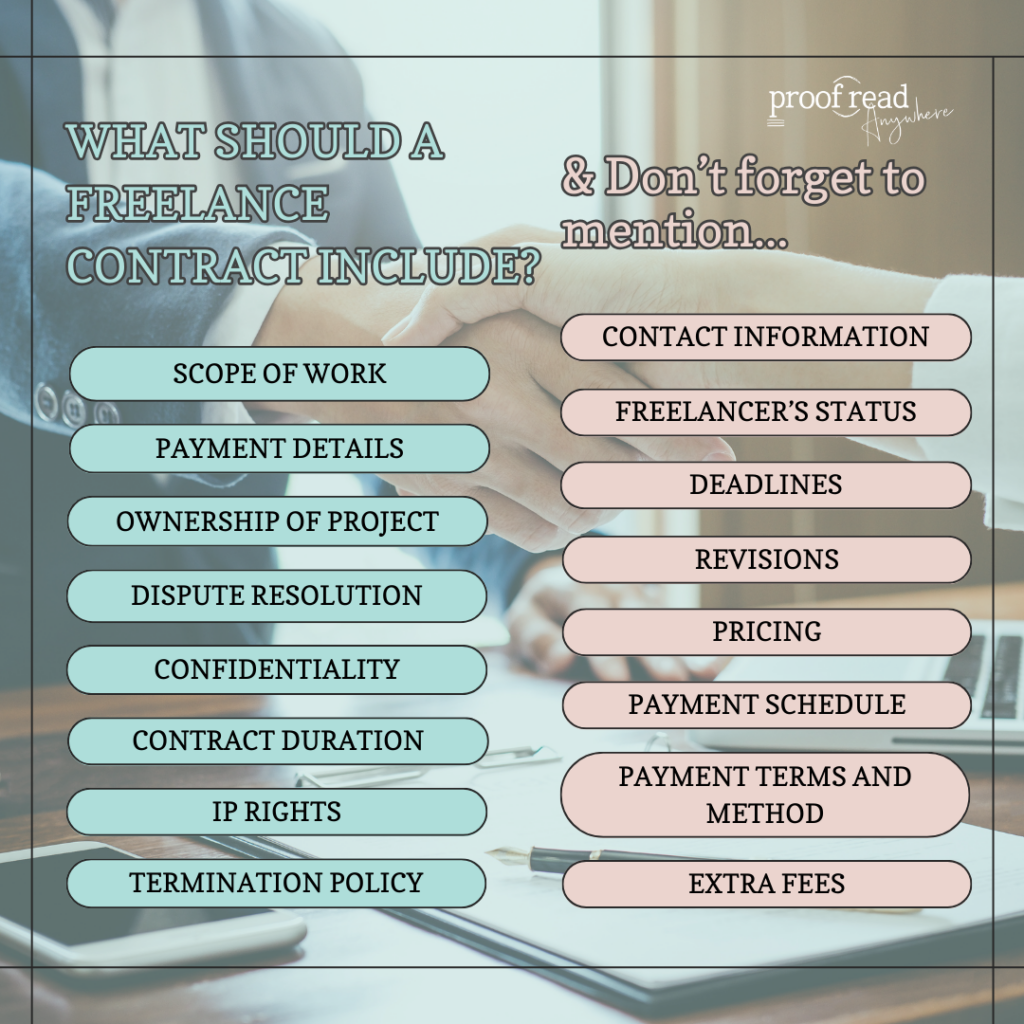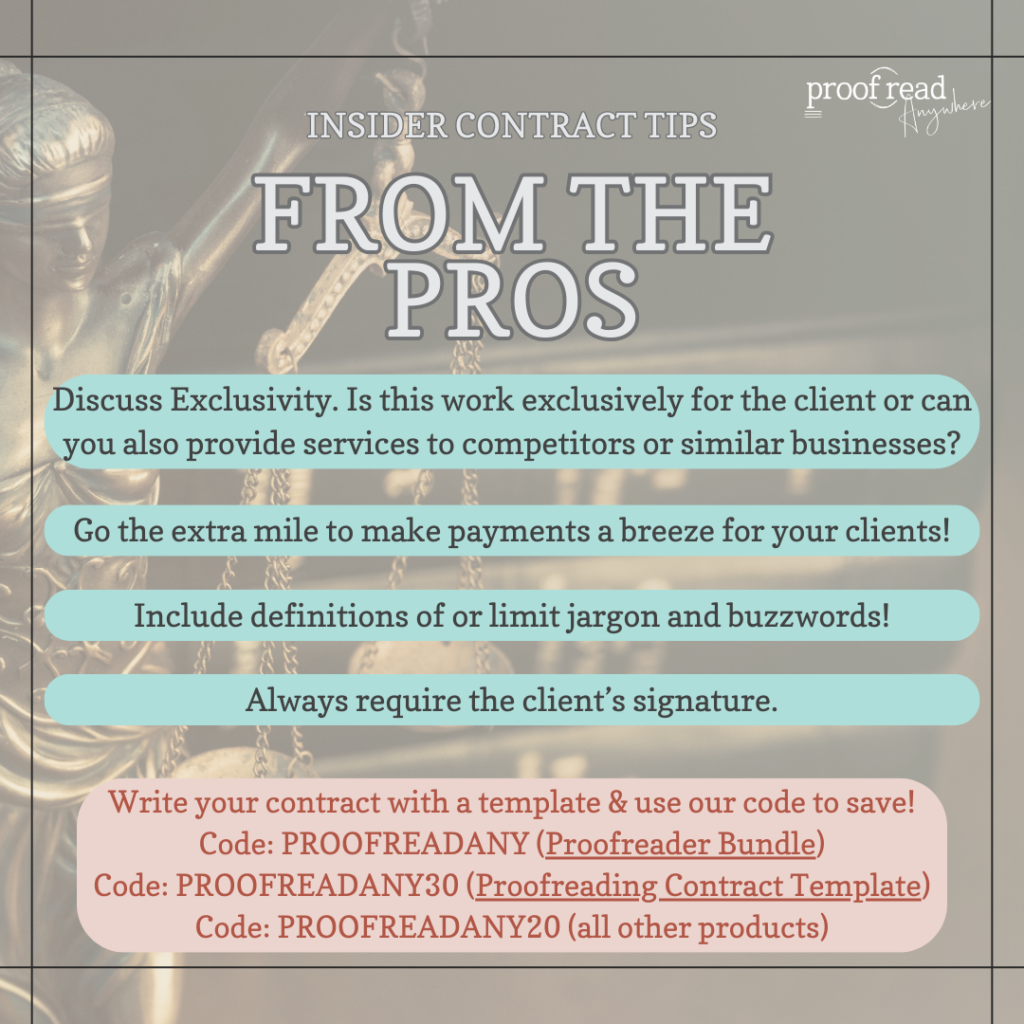Impact-Site-Verification: 908097839
[Affiliate Disclosure: We receive a commission if you purchase something through one of these links. All affiliates are thoroughly checked for quality and reliability. Affiliate commission helps us provide tons of useful free content and 100% free proofreader referral services.]
Freelance Contract Templates (& Why We Love Them)
Freelance contracts would be obsolete — if this were a perfect world. Clients would specify clearly what they want, collaborate throughout the process, and pay for invoices on time.
In reality, while the majority of clients you’ll meet will adhere to your terms and pay you right away for your work, you’ll inevitably have that one client who suddenly introduces new, unreasonable demands as the project progresses.
That’s why, at Proofread Anywhere, we advise our students to draft up a good freelance agreement before anything else. While we can’t offer legal advice, we can explain what contracts look like and point you in the direction of legal professionals.
A good contract grants you protection against dodgy potential clients, helps you come across as a professional, and helps you avoid those projects that aren’t in line with your capability.
We love contracts because, in the long run, they save both parties precious time and money and slide us right through those uncomfortable situations.
What is a Freelance Contract?

A freelance contract is a legally binding document that clearly lays out the working relationship between a freelancer and the client wanting to use their services. It ensures both parties understand exactly what the work will involve and how much the freelancer will be compensated.
Freelance contracts also clearly outline project delivery times, payment terms, the allowed maximum number of revisions, and the right course to take in the event a client isn’t satisfied with the freelancer’s services.
Purposes & Parties Involved in Legal Documents
A contract’s purpose is to outline the rights and responsibilities of the freelancer and the client. Its main goal is to protect both parties should anything go awry, like a late payment or missed project deadline.
Legal Implications of Freelance Contracts
Once a contract is signed, both parties are legally obligated to uphold the contract, which means to fulfill the terms and conditions, or rules and expectations, outlined in the document. If one party fails to uphold the contract, the other can use the document as evidence against them in court. It can be important to also include a termination clause so both parties know what will happen if the terms of the contract are broken.
For example, the freelancer can sue the client if they fail to pay the agreed amount, while the client can sue if the freelancer doesn’t deliver the work as they agreed to.
Using a contract, that defines these terms and conditions, is an important safeguard measure that can save you from the headache of a dispute. And no, writing your own contract doesn’t require a law degree!
When in doubt, go with the pros!

Contract writing can be tough. It’s intimidating, time-consuming, and can leave you feeling like you’re stuck in a swamp of technical legal terms. If you’re feeling overwhelmed, remember that you can always use a premade template.
The Contract Shop’s templates have been developed and peer-reviewed by legal professionals, so you can rest assured your contract won’t miss any critical information, will keep you protected, and give your freelance business a professional look. And with our promo codes, these templates won’t break the bank!
Use code: PROOFREADANY ($300 discount for the Proofreader Bundle)
Use code: PROOFREADANY30 (30% discount for the standalone Proofreading Contract Template)
Use code: PROOFREADANY20 (20% discount for all other products on The Contract Shop site)
Why Use a Freelance Contract?

A freelance contract defines ownership rights and how clients can use your work. This document not only sets clear expectations but also helps prevent miscommunications and the potential for payment disputes, which can be both stressful and expensive!
Moreover, having a freelance contract in place establishes your professionalism in the eyes of your clients, giving you the perfect foundation to build a strong, long-lasting business relationship.
Avoid Payment Problems
There’s no getting around it: talking about money with clients can feel awkward. You might find yourself wondering if your follow-up message, “Hey, did you see my invoice?”, was presumptive, or you may begin to worry that your payment terms were unclear. And doubts might begin to settle in—am I too confrontational? Should I back down?
But take courage! And stand on your contract. It’s the cornerstone of your professional partnership and should be used to navigate your working relationship. In the case of a payment problem, simply bring up the contract with your client and highlight the relevant payment terms and conditions.
For instance, if your client asks for a third revision, highlight the clause that stipulates two free revisions maximum, with additional revisions priced at an hourly rate of X.
Or, if your client has yet to pay the invoice you sent last month, send them a reminder of the fact that, as outlined in the contract, a late payment incurs an additional 5% fee.
What makes this approach even better is that a contract can prevent a lot of these payment problems from happening in the first place!
Clarify Ownership
As a freelancer, establishing intellectual property rights upfront is important to save you from possible legal trouble later.
Firstly, establishing who owns the rights to your work defines whether or not you can use a piece of work in your portfolio. And, secondly, specifying how clients can use your work prevents unauthorized changes or reuse—such as swapping your byline for another author, recycling your work in unrelated projects, or butchering—ahem—altering the work beyond your comfort level.
What Should My Freelance Contract Include?

Your freelance contract, also known as an independent contractor agreement, should encompass several critical aspects to ensure a smooth working relationship. We’ll guide you through each of these components and explain their significance.
Here are the essentials:
- Scope of Work
- Payment Details
- Ownership of Project
- Confidentiality (to avoid sharing trade secrets)
- Dispute Resolution
We know this can seem overwhelming at first, but we’re here to guide you through every step. Our partnership with The Contract Shop can also get you plenty of premade contract templates to simplify the process. Each contract is attorney-prepared, easy to edit, and covers everything you need.
The Boring Stuff
Yes, nitty-gritty may be boring, but it’s still important to mention! Your contract should include some small yet important details, such as:
- Full legal names and contact details of both parties
- Effective date of the contract
- Freelancer’s status as an independent contractor
Contact details entail the phone numbers, email addresses, and business websites (like your freelance website) of both parties, as well as their electronic signatures.
It’s also important to define the freelancer’s status as an independent contractor and not an employee, as this sets the overall tone for this type of contract.
The Whats & Hows
Overall, your freelance contract should include a clear breakdown of the work involved, by covering aspects such as:
- Services: Provide an itemized list of the freelance projects and services to be performed. Some examples include fact-checking, research, blog post creation, SEO optimization, and newsletter creation.
- Deadlines: Specify clear deadlines for each aspect of the project, including deliverables (e.g. individual blog posts), final deadline for the entire project, and deadlines for reviewing edits and rounds of revisions.
- Revisions: Outline the maximum number of revisions you are willing to provide.Typically, freelance workers offer up to three revisions for free, depending on the complexity and scale of the work. Include a clause for charging additional revision fees if necessary.
- Contract Duration: Clarify the duration of the contract. Mention if it’s for a single project with a fixed timeframe, or indicate an “indefinite term” for ongoing arrangements. And, for long-term relationships, be sure to specify the end date.
Use clear, precise, digestible language when discussing services, and be as detailed as possible. This will help prevent confusion about the work you do and set your boundaries.
Money Matters
Doing the work you love is a rewarding and fulfilling experience. But what feels even better is getting paid on time (this does a world of good in helping you manage your finances as a freelance proofreader or freelance writer, for example)! A contract allows you to establish exactly how much you’ll be paid, how you will receive the payment, and more importantly, when the client should pay you.
The payment aspects to include in your freelance contract are:
Pricing Structure
Break down your freelance rates for the project and the pricing method you will be using. Most independent contractors charge hourly or set flat package prices, day or monthly rates—it all depends on how you choose to work.
For example, freelance content writers, and copywriters, typically charge by a per-word rate, while editors and proofreaders typically charge by the page.
Payment Schedule
Outline exactly when you want clients to make payments. For example, you might agree on 50% of the payment upfront and 50% once the project is complete; a split payment structure, such as 50/25/25; or payment divided into several milestones, which is commonly used for long-term projects.
Payment Terms
Specify the period of time the client has to pay you once you have submitted the invoice. Consider a net-30 approach, which gives your client up to 30 calendar days to pay once they receive the invoice, or a net-14, which will gives clients 14 days.
Alternatively, if you’re just starting out and don’t have a steady source of income to rely on yet, you can opt for the “due on receipt” approach, which ensures clients pay immediately once the project is complete.
Payment Method
Ensure the payment instructions in the contract are straightforward. You should specify the available payment methods, including options like PayPal, direct deposit, or credit card payment. Either way, ensure all necessary details are provided for clients to make payments easily.
For international clients, determine the currency for transactions. If you accept payments in an alternative currency, be sure to account for conversion fees in your rates. This ensures transparency and simplicity in the payment process.
Additional Payment Fees
To cover all your bases, consider incorporating the following fees into your contract:
- Revision Fees: Specify fees for additional revisions beyond the agreed-upon limit to ensure clarity on costs for both parties.
- Late Payment Fees: Define penalties for delayed client payments to encourage timely settlement.
- Contract Termination Fee: Establish a fee structure for contract termination, outlining conditions and charges.
Depending on your role, you may also need to factor in additional expenses. For example, if the project requires you to buy specialized equipment or service subscriptions, include a clause clarifying that these extra costs aren’t your responsibility and should be reimbursed by the client.
The Legal Stuff
Legal jargon can be scary, akin to deciphering a foreign language! But don’t let that deter you from writing your freelance contract. Below, we’ll provide clear guidance on the more technical legal aspects, including intellectual property, confidentiality, and dispute resolution.
Intellectual Property
As a freelancer, you need to be clear with your clients about who retains the rights to your work, and how it can be used.
Here are the IP clauses to include in your contract:
- Ownership of Intellectual Property Rights: Specify who owns the intellectual property rights upon completion of the work. This may include whether the client is given full ownership or if the freelancer retains any rights.
- Usage Rights and Portfolio Display: Define the usage rights of the work produced. This includes whether the freelancer can include the published work in their freelance portfolio. Discuss whether the client is allowed to republish the work, change the author’s name, make revisions without the freelancer’s consent, or claim it as their own work.
- Reversion of IP Rights: Clarify if the intellectual property rights will revert back to the freelancer after a set timeframe. For example, specify if the client is allowed to publish the work for a limited period.
Confidentiality
No, you don’t have to be in the CIA to have a job that revolves around safeguarding sensitive information! In freelancing, it’s likely you’ll encounter clients who want you to work under an NDA (Non-Disclosure Agreement), keeping all aspects of the project confidential until publication (this is especially true if you’re working as a ghostwriter).
Some reasons confidentiality matters in freelancing include:
- Protection of Personal Data: In professions like freelance proofreading, especially transcript proofreading, you may encounter documents containing personal and sensitive data. Maintaining confidentiality is crucial to upholding your clients’ privacy.
- Client Trust and Security: Including a confidentiality clause in your contract assures clients that business strategies, personal data, creative concepts, and unpublished works will be handled with utmost care, preventing any unauthorized disclosures. This reassures clients and promotes trust, fostering a secure and professional working relationship.
- Dispute Prevention: Defining confidentiality within the contract sets clear boundaries on what information is to remain confidential during and after project completion. This helps prevent disputes and misunderstandings.
…And this leads us nicely to the next important clause to include in your contract.
Disputes
Disagreements are bound to happen from time to time, whether due to miscommunication, unrealistic expectations, or quality issues. While many disputes can be resolved by communicating, you may need to terminate the contract if you’re both unable to resolve the problem. Having a dedicated contract section covering termination policies will help make this process go smoothly.
Some popular freelance gig termination policies include:
- Termination Clause: List acceptable reasons for contract termination, such as breach of contract, misrepresentation, unforeseen circumstances, or unsatisfactory results.
- Notice Period: Specify a minimum notice period for contract termination. This can be that either side must give at least 30 days’ notice before terminating the contract.
- Kill Fee (Cancellation Fee): If the project is cut short, you can specify that the client must pay a fee to compensate you for the time already put into the work.
Feeling Overwhelmed?
A freelance contract is a vital safeguard measure, but there’s no denying that creating one can be overwhelming, especially for freelancers with no legal background.
But remember that you don’t need to navigate this alone. The Contract Shop provides contract bundles with great savings specifically for proofreaders. In addition, there are discounts tailored to a broader audience of freelancers looking for easier contract solutions, including freelance gigs like photography and graphic design.
We’ll list the discount prices and discount codes to access them, at the end of the article.
Insider Contract Tips for Any Freelancer

Our team at Proofread Anywhere has multiple years of freelance experience, and it’s safe to say that we’ve encountered numerous issues that could have easily been avoided with a solid contract!
Here are a few insider tips they would love to share so you don’t fall foul of the same mistakes:
- Discuss Exclusivity: Address the exclusivity of your services in the contract, especially if you specialize in a particular niche. Some clients may not want you to work with competitors in the same industry or business area, so laying it out in the contract will give them a clear picture of what to expect when hiring you and how you will engage with similar businesses.
- Require Contract Signing: It’s essential to obtain the client’s signature on the contract before beginning freelance work. Verbal agreements aren’t sufficient, as they can be easily changed. Signatures ensure clarity and commitment from both parties.
- Define Legal Terms: While it may seem unnecessary, it’s important to define legal terms used in the contract. Legal jargon and buzzwords can be confusing, and providing clear definitions helps clients understand their obligations and avoids confusion.
Make sure you get paid!
Getting paid on time can be one of the most frustrating aspects of freelancing. However, having a solid contract is key to ensuring clients are legally obligated to pay you for your hard work. You can make this even better by including specific clauses aimed at expediting payments.
For example, you can stipulate an upfront payment of 25% of the project’s total cost, establish a net-14 or due-on-receipt payment schedule, and even offer discounts to clients who settle within 24 hours.
That said, your primary focus should be to make it as easy as possible for clients to pay you. Take into account their preferred payment method, provide easy-to-follow payment instructions, and ensure your invoices are clean and organized. You can even send invoices directly through PayPal to allow clients to effortlessly pay with just a click.
Protect your hard work!
Getting paid isn’t the only concern—as a freelancer, you also have to know how to avoid work-from-home scams! That’s where getting your contract signed before you start working, and including specific clauses about intellectual property rights come in handy.
Manage expectations!
Sure, clients would love you to complete their project within just a day or two, but oftentimes that isn’t realistic. You’ll be juggling multiple projects at a time and several different clients, so make sure to keep each client informed on how long it’ll take you to complete their project and specify clear deadlines for deliverables in the contract.
When choosing deadlines, give yourself more time than you think you’ll need. If the project may take around seven days, set a deadline of ten days. This ensures you have more than enough time in case of unforeseen circumstances such as sickness.
